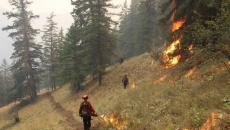HAMILTON - Prime Minister Justin Trudeau and premiers are to meet in Ottawa in two weeks to work on a new health care deal.
Trudeau said Wednesday he issued an invitation for the premiers to join him in the capital on Feb. 7, but he warned that Canadians shouldn't expect a deal to get done that day.
"It will be a good moment for us to gather, but we're not going to be signing deals on that particular moment," he said.
"It'll be about starting the very direct hard work of the bilateral arrangements that will happen with every province, while at the same time moving forward with a frame around data, health information and results that I think every Canadian wants to see."
The prime minister announced the planned meeting during a news conference Wednesday morning in Hamilton, Ont., where the Liberal cabinet is finishing a three-day retreat ahead of the return of Parliament next week.
Canadians expect and deserve the best care possible. Today, I invited the premiers to Ottawa on February 7th so we can keep working together to strengthen the health care system – and to make sure people can access the services they need, when and where they need them.
— Justin Trudeau (@JustinTrudeau) January 25, 2023
Provincial and federal governments have been jockeying for a new deal for months, and the issue has been a key part of the cabinet's discussions this week.
The premiers have been signalling a desire to meet with Trudeau to discuss their demands that Ottawa increase its share of health-care spending from 22 per cent to 35 per cent.
They appeared to finally take matters into their own hands. A spokesman for British Columbia Premier David Eby told The Canadian Press Tuesday that premiers would be in Ottawa Feb. 12 and 13 for a meeting, and Trudeau was welcome to join them.
Trudeau has now issued an invitation to the premiers to come five days earlier. Ontario Premier Doug Ford immediately said he would be there.
"We have a lot discuss, including making sure the federal government properly funds the health care people rely on," he said on Twitter Wednesday morning. "When Team Canada works together, there's nothing we can't do."
Trudeau said Wednesday that funding will be part of the discussions, and Ottawa is going to put an "appropriate" amount of money on the table. He did not specify how much.
Canada's health-care system is strained to the breaking point following three years of COVID-19 and amid a growing shortage of health-care workers. Trudeau said Canadians have long prided themselves on the country's universal public health-care system.
"But what Canadians are experiencing right now is simply not living up to that promise or pride," he said. "Too many people don't have access to a family doctor or nurse practitioner. Wait times in emergency rooms across the country, particularly in rural areas, have become dangerously long."
He also pointed to the strain on health-care workers, many of whom are "on the verge of burnout."
Trudeau and Health Minister Jean-Yves Duclos have said that any new money will be tied to a requirement that provinces show how it will be used to improve patient care.
Specifically, Ottawa wants commitments to increase access to family doctors, end the long backlogs for surgery, improve mental health care, address the health issues of an aging population and overhaul health-care data systems, including digital medical records.
In November, a health ministers' meeting ended in turmoil when provinces refused to accept any new funding deal that had strings attached.
But progress has been made since the holidays, and both Ontario and Quebec have indicated a willingness to give Ottawa what it wants — at least when it comes to data and medical record technology.
Ottawa transferred $45.2 billion to provinces for health care for the current fiscal year and currently expects that amount to increase to $49.4 billion in 2023-24. Under the existing agreement, the transfers increase by a minimum of three per cent a year, or more under higher economic growth.
Collectively, the provinces spend more than one-third of their budgets on health care.
Finance Minister Chrystia Freeland said Tuesday that despite economic uncertainty, Ottawa knows Canadians expect all governments to find a way to protect and improve Canada's cherished public health-care system.






